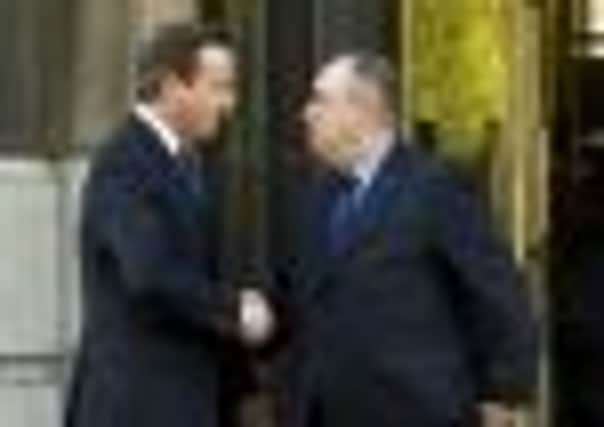Scottish Independence: Alex Salmond challenges David Cameron to TV debate


• First minister says he would take on Cameron ‘anytime’.
• Salmond leaves door open for more powers if Scotland votes ‘no’
The First Minister hailed the “Edinburgh Agreement” – transferring the power to hold a referendum from Westminster to Holyrood – as “a significant step in Scotland’s Home Rule journey”.
Advertisement
Hide AdAdvertisement
Hide AdHe said: “Importantly, it will ensure that the biggest decision the people of our country will make for many generations is made here in Scotland for the benefit of all of those that live and work here.”
The agreement, signed at St Andrew’s House yesterday afternoon, paves the way for the referendum to be held before the end of 2014 but requires a straightforward Yes/No question on independence with no other options. The Scottish Parliament will be responsible for the wording of the question and the campaign expenditure limits and will be able to extend the franchise to 16 and 17-year-olds.
Mr Salmond said: “It’s of vital importance that the question of process is agreed and put to one side so we can get on to the substantive arguments about what is in the best interests of the Scottish people.”
Debate
He said he would welcome a face-to-face debate with the Prime Minister on the issue of independence ahead of the crucial vote. He said: “I think that would be highly appropriate.” And he said he was ready to take on Mr Cameron at any time – “now, next week, next year, any time from now until the autumn of 2014”.
Mr Salmond had previously left open the possibility of a “more powers” option on the ballot paper, but the UK Government vehemently opposed such a move. Mr Salmond said: “In any negotiation there has to be an element of compromise on both sides,”
Mr Cameron left St Andrew’s House without speaking to reporters. But in a series of TV interviews he indicated that further devolution of powers could be on offer for Scotland if it votes to stay in the UK in the referendum.
He said: “I have always been of the view that we have to answer this prior question first. Does Scotland want to stay in the United Kingdom? If the answer is ‘Yes, we do want to stay in the United Kingdom’, then obviously further devolution is possible.”
Poll
But he said independence would mean the end of devolution. “All those who want to see not only the status quo but further devolution from the United Kingdom to Scotland must vote to stay within the United Kingdom. Then it’ll be for all the parties to decide what proposals to put forward.”
Advertisement
Hide AdAdvertisement
Hide AdA poll on independence published last week showed support for the Union at 53 per cent, compared with support for independence at 28 per cent.
Made in Edinburgh
THE historic “Edinburgh Agreement” between the UK and Scottish governments says the referendum should have a clear legal base.
The document, signed not only by Alex Salmond and David Cameron, but also by Deputy First Minister Nicola Sturgeon and Scottish Secretary Michael Moore, is accompanied by the crucial Section 30 Order by which Westminster hands Holyrood the power to hold the referendum on condition the poll is no later than December 31, 2014 and “there must be only one ballot paper and the ballot paper must give the voter a choice between only two responses”.
COUNTDOWN BEGINS
SCOTLAND now faces a 100-week campaign before voters are finally asked to put their cross on a ballot paper for or against independence.
Before the end of this month, the Scottish Government will publish the results of its consultation on the referendum. In February next year, the Scottish Government will publish its Referendum Bill, which is expected to include the exact date for the vote and the precise wording for the question.
In November next year, a White Paper on independence will be published, offering a detailed “prospectus” setting out what an independent Scotland would look like.
The referendum will take place in autumn 2014.